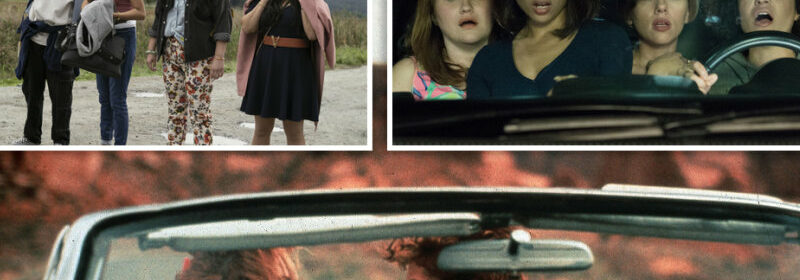Buckle up, bestie: The timelessness of the girls’ trip flick

Save articles for later
Add articles to your saved list and come back to them any time.
A rag-tag group of women are dissatisfied with life. One might have marriage problems, another doesn’t enjoy their job and perhaps the rest haven’t matured past high school. So they decide to hit the road, hoping a change of scenery will reinvigorate them with purpose.
Along the way, they laugh, fight and perhaps even have a brush with the law. But by the end of the journey, they have a new lease on life and renewed appreciation for friendship.
Girls’ trip films have been a hit with audiences since the early 90s.
It’s the classic girls’ trip film, a genre that has been a Hollywood mainstay since the early 90s. Its plot is by no means revolutionary and several have been critically panned, yet they seem to keep resonating with audiences. For example, The Sweetest Thing, a film about a group of women who go on a road trip to gatecrash a man’s wedding, received only a 26 per cent critic score on Rotten Tomatoes, but a 65 per cent audience score.
Adele Lim’s new comedy Joy Ride – which follows four young Asian-American women who travel to China to find one of their birth mothers – is the latest instalment in this popular genre. So, what is it about “girls’ trip” movies that makes them so timeless?
Every film of its ilk contains these foundations: a female-led cast with disparate personalities embarking on some form of travel peppered with obstacles and hijinks. Its simple formula can be easily applied to any time or place – allowing filmmakers to tackle a multitude of real-world issues and anxieties.
One of the earliest films in the canon is Ridley Scott’s 1991 hit, Thelma & Louise. Thelma is a dissatisfied housewife yearning for fun and Louise is an independent waitress who knows how to let loose. They load up the car for a fishing trip, but end up fleeing to Mexico after Louise kills a man for attempting to rape Thelma.
All base ingredients are included – two distinct female protagonists leave for a cross-country journey that irreversibly changes their lives. Beyond that, however, it’s a study of PTSD and the consequences of sexual assault.
Girls’ trip films continue to create space to examine heavier matters. In Thelma & Louise it’s rape. In Unpregnant (2020), which follows a 17-year-old Missouri girl travelling to New Mexico with her childhood friend to get an abortion, it’s the threat against women’s reproductive rights.
In this year’s 80 for Brady, a raucous comedy about four women over 80 who decide to go to the Superbowl to meet their sporting hero, they battle ageist attitudes, particularly those geared towards women.
80 for Brady fights back against ageist attitudes whilst reinforcing the importance of life-long friendships.Credit: Paramount Pictures
Many of the more contemporary films, such as Rough Night (2017) or Joy Ride, offer a refreshing counterpart to R-rated male-driven comedies like The Hangover. Superficially, they appear similar – groups of people getting drunk, doing drugs and having sex – but the ‘girls trip’ versions centre women’s experience of such experimentation.
Beneath the raunchy façade often lies an exploration of the complex “modern woman”, including her position in the workforce, the difficulties around child-rearing, the messiness of adult friendship, and the realities of marital intimacy.
In Girls Trip (2017), Sasha (Queen Latifah) struggles with what she perceives as her professional failures after transitioning from being a high-flying journalist to a gossip blogger. Meanwhile, her friend Lisa (Jada Pinkett Smith) juggles the demands of being a nurse and a single mum. And Ryan (Regina Hall) questions whether it’s possible to have it all – professional success and a loyal partner.
Though these subjects appear in other non-roadie films, such as Marriage Story and This Is 40, the characters in girls’ trip films deal with them in unfamiliar surrounds, where the physical journey is often a metaphor for personal transformation.
For example, in Tammy (2014) Melissa McCarthy plays a woman who decides to travel to Niagara Falls with her grandma after getting fired and discovering her husband was cheating on her.
Scenes jump from an Illinois fast food restaurant, a Kentucky bar, jail, a lake house, retirement home and Niagara Falls, exploring new lands as they discover new things about themselves.
Ultimately, these films reinforce the sacredness of female friendship. By the end of the journey, the characters recognise it isn’t their job, marriage or status that defines them, rather it’s the people who share the journey with them, supporting them along the way.
Support is available from the National Sexual Assault, Domestic Family Violence Counselling Service at 1800RESPECT (1800 737 732).
Joy Ride is now showing in cinemas.
Find out the next TV, streaming series and movies to add to your must-sees. Get The Watchlist delivered every Thursday.
Most Viewed in Culture
From our partners
Source: Read Full Article

